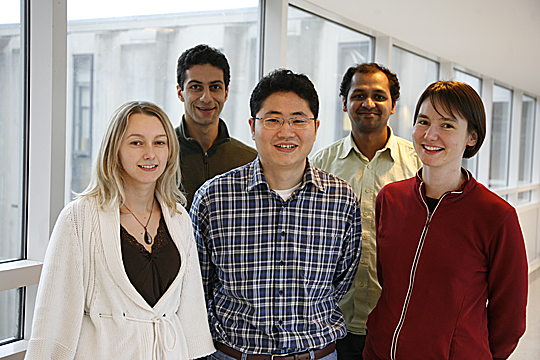Thinking globally, researching locally
Post docs bring international perspectives to scientific research

Sekuler Lab post-docs.
It is axiomatic that the best scientific research requires not only subtle brainpower but also broad thinking across disciplines. Combine these qualities in researchers who come to Brandeis from around the world with training in all kinds of scientific disciplines, and global thinking takes on new meaning.
Neuroscientist Robert Sekuler’s visual cognition lab typifies the Brandeis approach to research. With post-docs from Korea, India, Northern Ireland, Iran, and Alabama, the lab is a hive of international collaboration with expertise across a range of subjects including medicine, computer science, and psychology.“My lab benefits from having people who represent different national and educational backgrounds, not just for their perspectives on science, but on the world,” explains Sekuler, the Louis and Frances Salvage Professor of Psychology and member of the Volen National Center for Complex Systems. “Plus it makes coming to work so much more fun.”
The lab’s researchers agree. “I love these guys,” quips Jooseok Hyun, who joined the Sekuler lab two years ago to study visual memory and who has recently accepted a faculty position in his native Seoul, Korea.
The lure of the Sekuler lab for Shivakumar Viswanthan was the opportunity to research “real people versus intelligent machines.” Born and educated in India as an engineer, Viswanthan completed a PhD in computer science with Professor Jordan Pollack before tackling how memory works in tandem with spatial navigation in Sekuler’s lab.
“Shiva has in short order mastered this new field, in part because of what he learned as an engineer and computer scientist,” says Sekuler.
Like any international student or researcher, Viswanthan had to do more than learn the ropes in the lab. “When I first got here, there was also a lot of cultural learning to do,” he notes.
Iranian-born Arash Fazl received his MD in Tehran and practiced medicine there before coming to the U.S. in 2001. Working with electroencelphalography (EEG) technology, he is studying the neural relationships between visual attention and visual learning.
Nichola Rice grew up in Northern Ireland, received a PhD in psychology in the U.K., and completed post-doctoral work at Dartmouth before making her way to Sekuler’s lab, where her research interests include visual perception, visuo-motor control, and procedural learning. Post-doc Kristina Visscher, raised in Alabama, is using functional magnetic resonance imaging, along with EEG and psychophysics techniques, to explore memory for sound and vision, and attention’s effects on visual memory.
“Each one of my post-docs has brought something special to the lab,” explains Sekuler, adding that even hiring decisions are a team effort since projects are collaborative and cooperation is essential.
Indeed, the post-docs say that one of the selling points of doing research at Brandeis is precisely that collaboration trumps competition. “There are labs that make people compete against each other, but you can suffer in those situations,” says Fazl.
“Interdisciplinary collaboration of all kinds, and cooperation, are the hallmark of Brandeis,” says Sekuler. “Because of the synergies that come from these collaborations, the university is effectively larger than the numbers would suggest.”
This year, of the 126 active post-doctoral researchers on campus, eighty-one are international, says research administrator Stephen Van Ness. That’s enough to make global thinking a local specialty.





